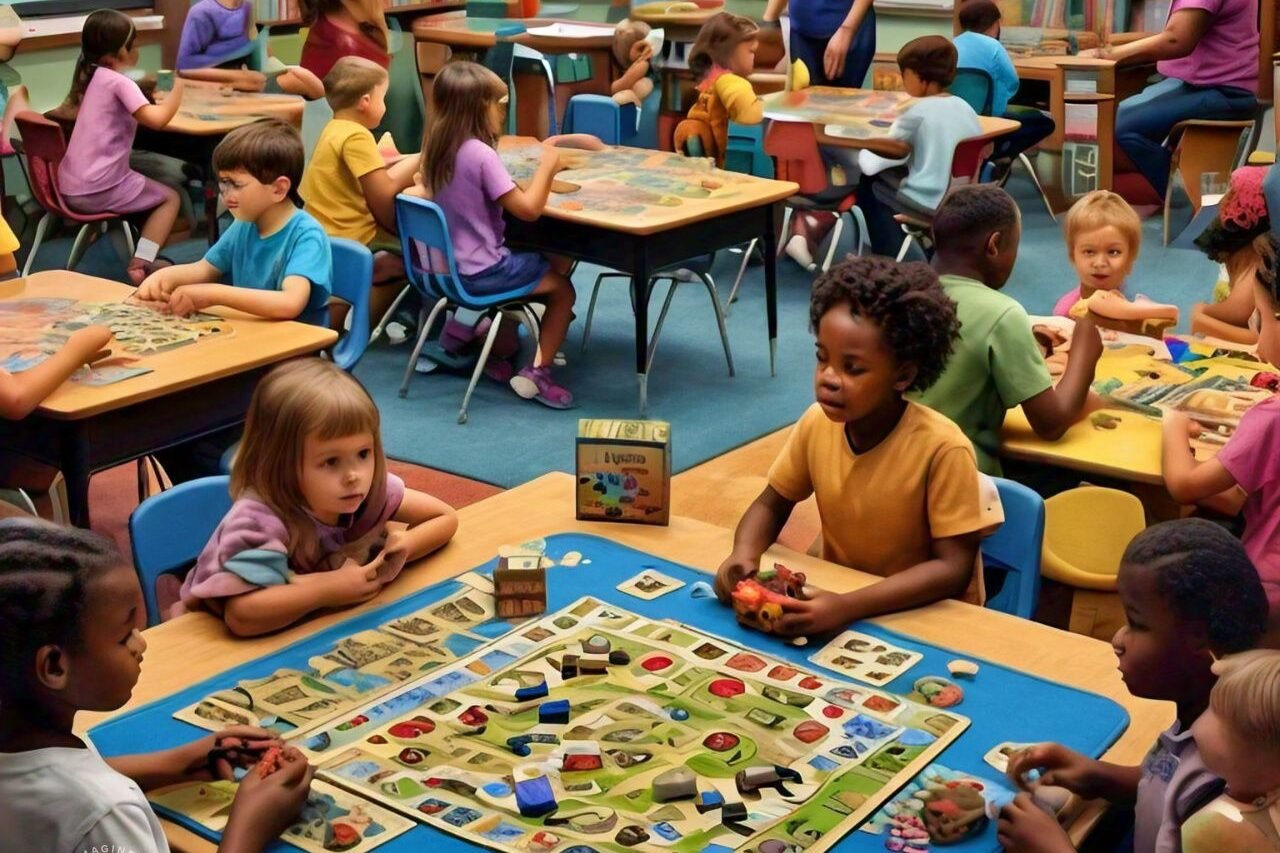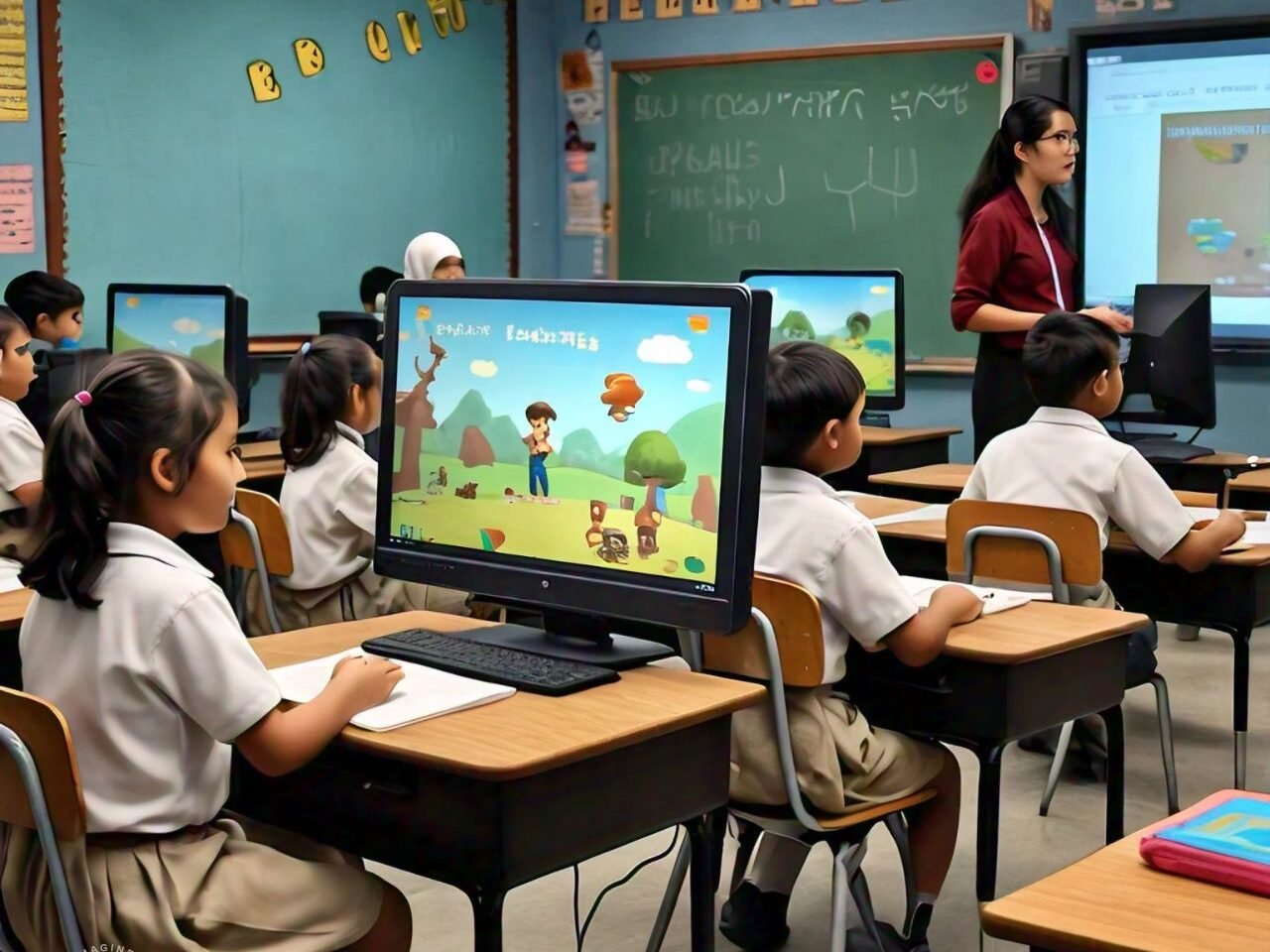Introduction:
Games have long been a staple of entertainment, but their value extends far beyond mere leisure activity. In recent years, educators and researchers have discovered the immense potential of games to enhance learning, engagement, and academic achievement. By harnessing the interactive, immersive, and dynamic nature of games, educators can create a more effective, enjoyable, and student-centered learning experience. From developing problem-solving skills and critical thinking to fostering creativity and collaboration, games offer a wide range of benefits that can be leveraged to improve educational outcomes. In this exploration games will delve into the world of games in education, examining the research, benefits, and best practices for integrating games into the learning process.

Continuation of the Introduction:
As technology continues to evolve and digital natives become the norm, games have become an integral part of modern life. The education sector has taken notice, and games are increasingly being used as a tool to enhance teaching and learning. By incorporating games into the curriculum, educators can:
- Increase student motivation and engagement
- Develop essential skills such as problem-solving, critical thinking, and collaboration
- Provide personalized learning experiences
- Make complex concepts more accessible and fun
- Foster creativity, innovation, and entrepreneurship
- Prepare students for an ever-changing, technology-driven world
In this exploration, we will examine the various types of games used in education, including:
- Video games
- Board games
- Card games
- Role-playing games
- Simulation games
- Serious games
Different approaches to integrating games into the learning process:
- Game-based learning
- Gamification
- Game-informed learning
Through real-world examples, case studies, and expert insights, we will investigate the impact of games on student learning outcomes, teacher professional development, and educational policy.”
Games have Immense Value in Education, offering Numerous Benefits:
- Engagement: Games increase student engagement, motivation, and participation.
- Interactive learning: Games provide an interactive and immersive learning experience.
- Problem-solving skills: Games help develop critical thinking, problem-solving, and analytical skills.
- Collaboration: Multiplayer games foster teamwork, communication, and collaboration.
- Real-world connections: Games can connect academic concepts to real-world scenarios.
- Feedback and assessment: Games offer immediate feedback and assessment opportunities.
- Differentiated instruction: Games can cater to diverse learning styles and abilities.
- Develops soft skills: Games help develop essential soft skills like time management, decision-making, and adaptability.
- Builds creativity: Games can foster creativity, imagination, and innovative thinking.
- Makes learning fun: Games make learning enjoyable, reducing stress and increasing enthusiasm.
Integrating games into education can enhance the learning experience, increase academic achievement, and prepare students for future success.
The Values of Games in Education:
- Engagement: Games increase student engagement and motivation.
- Interactive learning: Games provide an interactive and immersive learning experience.
- Problem-solving skills: Games develop critical thinking, problem-solving, and analytical skills.
- Collaboration: Multiplayer games foster teamwork, communication, and collaboration.
- Real-world connections: Games connect academic concepts to real-world scenarios.
- Feedback and assessment: Games offer immediate feedback and assessment opportunities.
- Differentiated instruction: Games cater to diverse learning styles and abilities.
- Soft skills development: Games develop essential soft skills like time management, decision-making, and adaptability.
- Creativity and innovation: Games foster creativity, imagination, and innovative thinking.
- Fun and enjoyment: Games make learning enjoyable, reducing stress and increasing enthusiasm.
- Personalized learning: Games provide personalized learning experiences tailored to individual needs.
- Develops emotional intelligence: Games help develop emotional intelligence, empathy, and self-awareness.
- Prepares for future careers: Games prepare students for future careers in STEM, coding, and emerging technologies.
- Builds resilience: Games help build resilience, perseverance, and grit.
- Fosters healthy competition: Games promote healthy competition, sportsmanship, and teamwork.
By incorporating games into education, we can create a more engaging, effective, and enjoyable learning experience for students.
Value of Games in Education are Important During Education:

- Enhanced engagement: Games increase student engagement, motivation, and participation.
- Deeper understanding: Games help students develop a deeper understanding of complex concepts.
- Improved retention: Games improve knowledge retention and recall.
- Development of soft skills: Games develop essential soft skills like teamwork, communication, and problem-solving.
- Personalized learning: Games provide personalized learning experiences tailored to individual needs.
- Real-world connections: Games connect academic concepts to real-world scenarios.
- Preparation for future careers: Games prepare students for future careers in STEM, coding, and emerging technologies.
- Building resilience: Games help build resilience, perseverance, and grit.
- Fostering creativity: Games foster creativity, imagination, and innovative thinking.
- Making learning fun: Games make learning enjoyable, reducing stress and increasing enthusiasm.
Education and Games are Connected to Each other in Several ways:

- Interactive learning: Games provide an interactive and immersive learning experience, making complex concepts more engaging and accessible.
- Engagement and motivation: Games increase student engagement and motivation, leading to a more effective learning process.
- Simulation and modeling: Games can simulate real-world scenarios, allowing students to experiment and learn from mistakes in a safe environment.
- Problem-solving and critical thinking: Games develop critical thinking, problem-solving, and analytical skills, essential for academic success.
- Feedback and assessment: Games offer immediate feedback and assessment opportunities, helping students track progress and identify areas for improvement.
- Differentiated instruction: Games can cater to diverse learning styles and abilities, providing personalized learning experiences.
- Cross-curricular connections: Games can connect multiple subjects, such as math, science, and language arts, promoting a more holistic understanding.
- Developing soft skills: Games develop essential soft skills like teamwork, communication, and time management.
- Real-world connections: Games can connect academic concepts to real-world scenarios, making learning more relevant and applicable.
- Fun and enjoyment: Games make learning enjoyable, reducing stress and increasing enthusiasm for education.
Naming Games can be a Valuable Tool in Education:
- Enhance memory and recall
- Foster critical thinking and problem-solving skills
- Encourage active learning and engagement
- Develop vocabulary and language skills
- Support concept formation and understanding
Examples of naming games in education include:
- Matching games (e.g., matching terms with definitions)
- Memory games (e.g., remembering locations on a map)
- Word association games
- Labeling games (e.g., identifying parts of a diagram)
- Quiz games (e.g., identifying historical figures or scientific concepts)
These games can be adapted to various subjects and age groups, making learning more enjoyable and effective.
- Flashcard games: Students match key terms with definitions or explanations.
- Bingo: Students identify and name concepts, terms, or images on a bingo card.
- Scavenger hunts: Students find and name objects, concepts, or information in a specific context.
- Crossword puzzles: Students fill in words related to a subject or topic.
- Word searches: Students find and name words hidden in a grid.
- Jeopardy: Students answer questions and name responses in a quiz format.
- Naming conventions: Students learn and apply standardized naming systems (e.g., scientific classification, mathematical notation).
- Memory matrix: Students match pairs of words, images, or concepts.
- Labeling exercises: Students identify and name parts of a diagram, image, or model.
- Terminology charades: Students act out or describe key terms or concepts for classmates to guess.
These games can be used in various subjects:
- Science (e.g., naming elements, species, or processes)
- History (e.g., naming events, figures, or periods)
- Language arts (e.g., naming literary devices, authors, or characters)
- Math (e.g., naming concepts, formulas, or theorems)
- Foreign languages (e.g., naming vocabulary, phrases, or grammar rules)
Benefits of Games in Educations:
- Develops spatial awareness and visual processing
- Enhances data analysis and interpretation skills
- Fosters healthy competition and sportsmanship
- Supports special needs education (e.g., autism, ADHD)
- Encourages lifelong learning and curiosity
Examples:
- STEM education:
- “Ker Space Program” (physics, engineering)
- “Code Combat” (coding, programming)
- Social studies:
- “This War of Mine” (humanitarian crises, empathy)
- “Democracy 3” (government, politics)
- Language learning:
- “Duolingo” (vocabulary, grammar)
- “(link unavailable)” (vocabulary, reading comprehension)
- Business and entrepreneurship:
- “SimCompany” (management, marketing)
- “Transport Tycoon” (economics, logistics)
- Health and wellness:
- “Zombies, Run!” (fitness, exercise)
- “Moodfit” (mental health, self-care)
Games can be a powerful tool in education, offering an engaging and interactive way to learn and develop essential skills.
Benefits:
- Develops adaptability and resilience
- Enhances cultural awareness and understanding
- Supports differentiated instruction
- Fosters a growth mindset
- Encourages active learning
Examples:
- Environmental education:
- “Eco” (ecosystem management)
- “SimEarth” (climate change, sustainability)
- Art and design:
- “Minecraft” (creativity, building)
- “Adobe Photoshop” (digital art, editing)
- Music and audio production:
- “Guitar Hero” (music theory, rhythm)
- “FL Studio” (music production, composition)
- Physical education:
- “Wii Sports” (motor skills, coordination)
- “Zombies, Run!” (fitness, running)
- Career and technical education:
- “Game Dev Tycoon” (game development, programming)
- “Cooking Simulator” (culinary arts, time management)
Additionally, games can be used to teach soft skills like:
- Communication
- Teamwork
- Time management
- Leadership
- Problem-solving
Following Things are not Suitable for Students:
During game play in academic settings, the following things are not suitable for students:
- Violent or aggressive content
- Mature themes or explicit language
- Discriminatory or biased content
- Excessive competition or stress
- Unsupervised or unstructured game play
- Games that promote cheating or dishonesty
- Games that are too easy or too hard, leading to boredom or frustration
- Games that lack educational value or relevance
- Games that promote addiction or excessive screen time
- Games that compromise student data or privacy
Educators should Consider:
- Age appropriateness
- Alignment with learning objectives
- Balance between game play and academic work
- Inclusivity and accessibility for all students
- Monitoring and guidance during game play
- Encouraging responsible and respectful behavior
- Avoiding games that may trigger sensitivities or anxieties
- Ensuring games are free from advertisements or in-game purchases
Conclusion:
- Games can enhance student engagement, motivation, and participation.
- Games can improve learning outcomes, retention, and understanding of complex concepts.
- Games can develop essential skills like critical thinking, problem-solving, and collaboration.
- Games can promote creativity, innovation, and entrepreneurship.
- Games can support personalized learning, differentiation, and inclusivity.
- Games can foster emotional intelligence, empathy, and social skills.
- Games can provide real-time feedback, assessment, and data analysis.
- Games can make learning fun, enjoyable, and interactive.
Games have the potential to transform the education sector by:
- Increasing student achievement and success
- Improving teacher effectiveness and efficiency
- Enhancing the overall learning experience
- Preparing students for the digital age and future careers
- Bridging the gap between theory and practice
